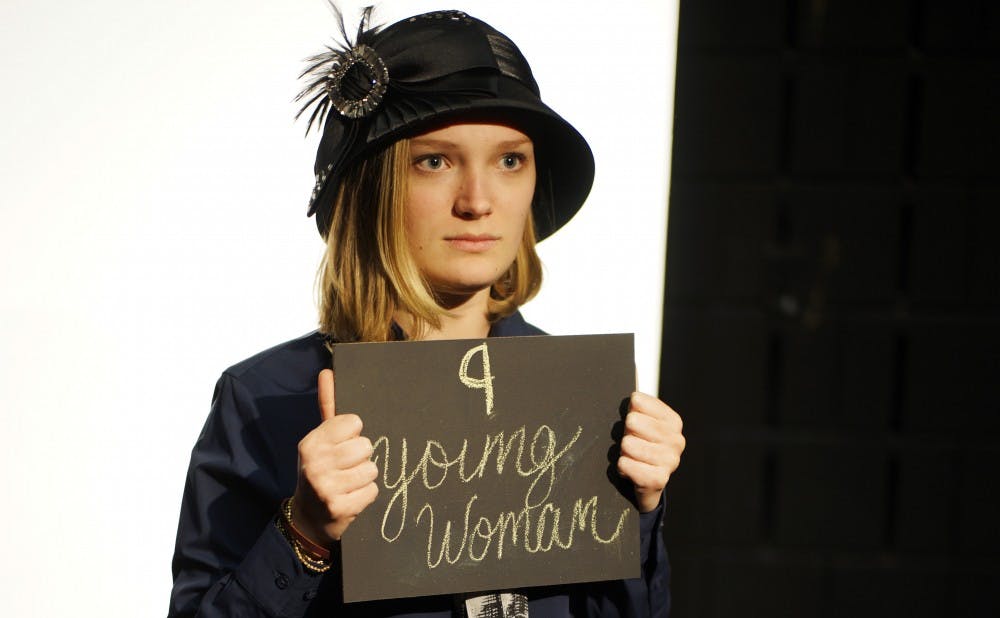"Machinal," by American playwright Sophie Treadwell, debuted in 1928 but was recently revived on the Broadway stage and, tonight, will premiere at Duke's Sheafer Theater.
The play is loosely based on the well-known case of Ruth Snyder, whose 1928 execution by electric chair for murdering her husband was captured on film and published on the front page of the New York Times. In the subsequent controversy that embroiled both the journalistic world and public sphere, this case became the one of the most significant of the century.
In "Machinal," however, the focus is not on the young woman’s act of murder. Rather, the play is a witness to her struggle with life as she marries her boss, has his child, has an affair, murders her husband and is electrocuted.
“What drives the play is her struggle, her desire to be free,” said Jules Odendahl-James, resident dramaturg and "Machinal" director.
The young woman, nameless for most of the play, is eventually revealed as Helen Jones. Her character is just as archetypal and universal as her name—or lack of a name—suggests.
“She is meant to represent any woman, any identity,” said Madeleine Pron, the Trinity sophomore who plays the young woman.
Stuck within the patriarchal society of the 1920s, the young woman is a mismatched gear in the machine of society, an unwilling participant in the mechanized nature of daily life. Within this structure, she is forced into the rigidity of female constraints and expectations: work, marriage and family.
The play is defined by its disconnected, hammered dialogue, which itself seems to have been mass-produced by the all-encompassing societal machine.
“It’s about a life machine, so the title is the French word for life and machine, together,” Odendahl-James said. “The way that the story is told is a very heavily sensory experience. Machine sounds, the external world…all the sounds are layering in…because she can’t shut off her brain and her senses.”
The implicit perception of women as mere gears within a literally man-made machine is brought to the fore by the young woman's interactions with men.
“The husband, George H. Jones, is the named character…his title defines him and his position. He treats his interactions with the young woman as a business transaction and thinks of her as a piece of property to acquire,” said junior Thomas Kavanagh, who plays the husband.
The young woman’s inability to close off the outside world and thus escape her oppressors forces her to seek an unviable freedom. The consequences she ultimately faces suggest that perhaps there is no possibility of freedom within the structure of society—perhaps freedom can only be obtained in its absence.
“I hope the audience comes away wondering what other muddy, unclear social structures are designed to keep people down in their lives, what machines are running their lives and what machines they are a part of,” Kavanagh said.
To this day, the message of "Machinal" is still relevant. The play's pertinence to the present encompasses far more than issues of gender. Whether it be in our interactions with the machines of society or in our relationships with one another, issues of oppression and constraint still prevail.“I hope that in some way, in some scene, the audience can relate to the young woman character, understand what about her situation makes her who she is and see how she relates to their life," said stage manager Kara Post.
"Machinal" questions the meaning of freedom and its potential to exist. It shines a light on a machine-like society that continues to thrive as the young woman’s story continues and repeats in the life of any woman both now and in the future.
As Odendahl-James put it, “These are conversations we are still having.”
"Machinal" will show in the Sheafer Lab Theater in the Bryan Center. The play opens today, April 3, at 8 p.m. and will run through April 13. Tickets are available online or at the box office. For more information, visit the Duke Theater Studies website.
Get The Chronicle straight to your inbox
Signup for our weekly newsletter. Cancel at any time.

